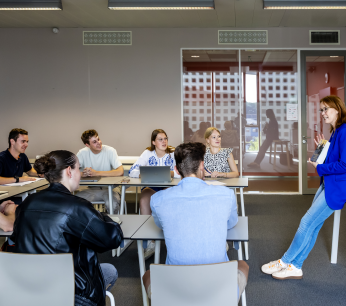Lecturers often follow compulsory teaching courses in their own time
Universities send their lecturers off to do teaching courses, but frequently don’t make any time available for this. “What you are in fact then saying, as a manager, is: I do not attach enough importance to this.”

beeld: XF\x26amp;M
Anyone giving seminars or lectures has to have a teaching qualification. This was agreed by the universities in 2008. From then on, lecturers would have to undergo training leading to the University Teaching Qualification (UTQ, in Dutch: BKO).
Initially, the numbers of lecturers with a teaching qualification*What is the situation in higher vocational education? Clear agreements on compensation for compulsory training courses are included in the collective labour agreement for universities of applied sciences. Lecturers starting out in higher vocational education can in any event obtain the ‘teaching qualification for lecturers at universities of applied sciences’. However, this still means the universities of applied sciences have to make investments to attract and retain new, highly educated lecturers. “On paper it’s all really well organised”, says General Education Union (AOb) representative Douwe van der Zweep. “100 percent compensation is provided in time and money for the teaching qualification – but in practice young lecturers are still struggling. The pressure of work is high, and often they are still finding their feet in teaching. There is also a high rate of turnover owing to the use of insecure contracts. A lot of starters leave the sector again fairly quickly.” shot up – but in recent years growth has been stagnated: from 63 percent in 2018 to 64 percent in 2019. There is significant room for improvement, particularly among lecturers on a temporary contract.
Excessive pressure of work
However, for many lecturers these training courses are not something that can be done ‘on the side’. An illustration: at Erasmus University Rotterdam, the total study time required to obtain the UTQ (including private study) is estimated at 80 hours. At Amsterdam’s Vrije Universiteit, this is 150 hours; almost twice as long. And this while the pressure of work in higher education is already excessive.
Nevertheless, compensation for the time invested by lecturers in these courses is by no means always given, a survey of the universities has revealed. At the Open University of the Netherlands, TU Delft and the universities in Twente, Leiden and Tilburg, lecturers do not receive any remuneration for the hours they spend on obtaining the UTQ.
Gaining practical experience often overlaps with performing regular teaching tasks
Maastricht University offers all lecturers obliged to obtain the UTQ 40 teaching hours in compensation for the meetings. After all, gaining practical experience often overlaps with performing regular teaching tasks, according to the University.
At the University of Amsterdam, the Vrije Universiteit and Utrecht University, the policy varies between different faculties, and in some cases even between different departments. Some lecturers are given extra time, while others are not. The compensation received by individual lecturers can even vary within a single ‘UTQ class’. Utrecht University has announced that it will bring “greater uniformity” to its UTQ programmes from next year, thereby reducing differences in study load and compensation.
The boss’ time
How then can lecturers make time for this? At the University of Amsterdam, participants are generally able to "do it during working hours”, a spokesperson says. Lecturers at the Open University are also permitted to do this. And at TU Delft, lecturers are expected to work towards obtaining the UTQ 'in the boss’ time'.
The question however then arises as to what exactly is meant by 'working hours' or 'the boss’ time'. After all, being a lecturer is often not limited to clearly defined ‘working days, from 9 to 5’. Lecturers who spend Thursday afternoons on their UTQ portfolio instead of marking, frequently then find themselves facing stacks of unread exam papers in the evening or at the weekend.
Cramming
“In practice, at the moment it is often left up to the lecturers themselves”, says Utrecht University-based lecturer in biomedical sciences Marc van Mil, who is also a board member of the ComeniusNetwerk of recognised innovators in education. “But you can’t just cram for a process like this alongside everything else – this is only possible if other duties are removed, or with an extended contract.”
For this reason, Van Mil has set up a pilot project within his department at UMC Utrecht for doctoral candidates wanting to obtain their UTQ, but who don’t have time for this within their existing position. This pilot now means their contracts can be extended by six months for this purpose.
Ticking boxes
“You may ask yourself whether it is appropriate for someone without the UTQ to be teaching”, says Van Mil. “So then you should ensure that junior lecturers go straight into that training process – then they will be well-equipped to face the challenges of teaching early on in their careers. There’s nothing wrong with learning on the job in principle, as long as a serious training plan is in place and new lecturers are given the space to learn from and with one another.”
The UTQ is still all too often seen as a box that has to be ticked, instead of an opportunity to allow someone’s talents to blossom
“Institutions not providing time for the UTQ are really saying, as managers: ‘I do not attach enough importance to this’”, Van Mil argues. “Unfortunately, the UTQ is still all too often seen as a box that has to be ticked, instead of an opportunity to allow someone’s talents to blossom.”
Generous
The call for hours to be compensated is not new. In 2016, the ‘Higher Education Expertise Network’ (EHON) analysed all UTQ programmes at Dutch universities. The report issued back then recommended compensating lecturers for the time invested in this, as this was not being done 'at most universities'.
“Some institutions and faculties have become more generous”, says EHON chair Jaap Mulder. “Then you hope that others will take up the good example, and also reduce the teaching time by so many hours.”
Good teaching
In addition, last year universities and research funders announced that they wish to ‘recognise and reward' differently. Not only research performance but good teaching, strong leadership, the impact of research and (for medical doctors) good patient care will in the future weigh more heavily in assessments.
Mulder sees this as a step in the right direction. “If teaching careers are valued more highly, hopefully lecturers will also be given more time and money to develop.” Work towards this is already taking place in some quarters. Tilburg University is looking into whether UTQ compensation can be included in the recognise and reward project, a spokesperson has stated.
Don’t load up
Is it not possible to come to a nationwide compensation agreement? At present, you will not find anything about this in the collective labour agreement for universities, says Jan Boersma of the FNV (Dutch Trade Union Confederation). “We have not previously received such a request for compensation.”
He wonders whether an arrangement based on the allocation of hours is the right one. “The main thing is, there has to be sufficient scope within the employment relationship to complete the UTQ process. This means that you can’t just load up lecturers with teaching, because then they still have to do this in their spare time.”
According to Boersma, one of the main problems is therefore the fact that many young lecturers in higher education are being given temporary contracts. “So they don’t stay long enough to obtain the UTQ”, he says.
Sector representative Donald Pechler of the General Education Union (AOb) confirms this. “A UTQ process has to fall within the scope of the appointment. In the case of a one-year temporary contract, for example, this is really difficult.” He also considers that employers should facilitate obtaining the UTQ by granting time.
Both union representatives suggest that this is still a topic for the next round of collective labour agreement negotiations, which is scheduled to start soon.


